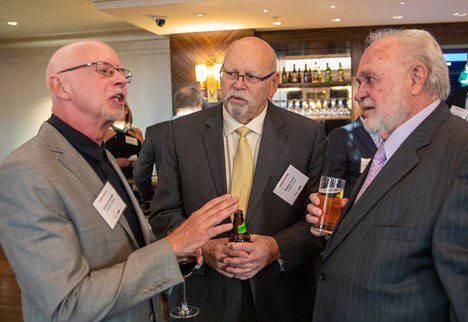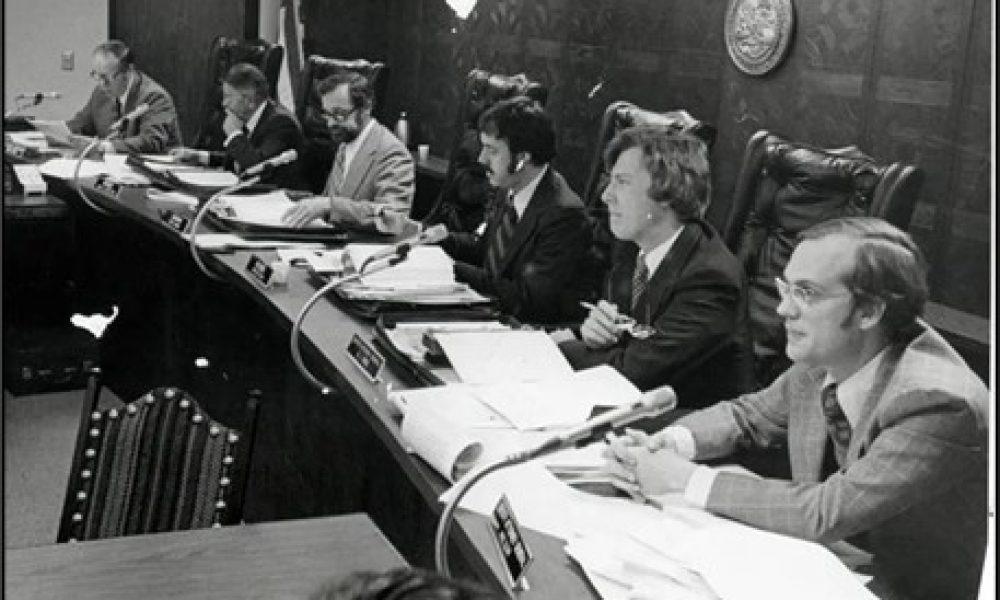Sadly, a giant of the casino industry, Philip P. Hannifin, lost his battle with lung cancer this week at the age of 88. While his name may not be familiar to those who’ve entered gaming in the last 20 years, all of us owe him a debt of gratitude for creating and shaping our current professional world.
As former Nevada gaming regulator and Everi CEO Michael Rumbolz said, “Phil Hannifin paved the way for Nevada’s present regulatory model as an exemplar of the ‘tough but fair regulator.’ His transition to an industry leadership role was an inspiration to many and proved that you could regulate with integrity and, when later working in the industry, continue to help licensed operators understand their compliance obligations.”
Today, most gaming regulators are held in high esteem for their strict enforcement and laser focus on protecting the integrity and legality of casino operations. But, before Hannifin’s appointment as Chairman of the Nevada Gaming Control Board, that wasn’t always the case. The NGCB was often viewed by many as more of a political body, rather than an arm of law enforcement.
In 1971, newly-elected Nevada governor Mike O’Callaghan made it his mission to change things, and he chose the 36-year-old Hannifin to do the job. It was the right choice, at the right time.
Gaming was in Hannifin’s blood as his father was an operator in Montana where he was born in Butte in October of 1934. He was quoted in an early company newsletter saying, “Growing up, it took me a while to realize that a slot machine was more than a toy.” He moved to Nevada in 1940, graduating from Reno’s Bishop Manogue High School and then receiving his degree in psychology from the University of Nevada, Reno in 1957.
At 23, he joined the Washoe County Probation Department. Eventually he ran Wittenberg Hall, then Reno’s Juvenile Detention Center. After several promotions, he was named as the director of the Nevada Parole and Probation department. In his four years there, he developed strong investigative skills and knew his way around the law and law breakers. Those were perfect credentials to carry out O’Callaghan’s mandate of stronger gaming oversight.
When I was a working news reporter covering him and his later stops as a casino executive, it was nearly impossible to get Hannifin to talk about anything. It wasn’t just me he shut out; he rarely talked to any reporter. As proof, search the internet all you like, and you’ll see how difficult it is to find photos or direct quotes from him during most of his gaming career. Unlike some flamboyant casino bosses, Hannifin preferred to stay out of the limelight and the headlines. But when I worked with him at the Fitzgeralds Group, where he was a board member, things changed.
Some of my best memories in gaming are of sharing dinners and wine with him. I discovered that far from being shy, he was a world-class storyteller. In the last few years, it has been hard for me to realize that he was in his late-80s. While he physically moved a bit slower, his commanding voice and hearty laughter were as strong as ever. And, again, he had some incredible stories.
Many of them would have made great episodes of “Law & Order” or new scenes for “Goodfellas.” One of the first things I ever asked him was about the movie “Casino.” “Was that really the way it was?” I was quite surprised to hear him say that director Martin Scorsese got most things right. Of course, the Tangiers Casino was the real-life Stardust and “Ace” Rothstein (aka Robert De Niro) was actually Frank “Lefty” Rosenthal.
He once told us the tale of trying to catch the mob “skimming” in the Stardust count room as the movie depicted. His team of enforcement agents made several raids, but whenever they arrived, they never could find anything amiss. In frustration (and smelling an internal leak in his office) Hannifin, without letting anyone else know his plan, ordered all his agents onto a chartered bus. They were off on a long trip without any stops for phone calls (these were pre-cellphone days). They eventually pulled into the Stardust parking lot and marched straight into the count room. Jackpot! They found ample evidence of illegal skimming (Note: The Stardust Casino site is now the home of Resorts World Las Vegas).
In fact, many credit Phil Hannifin with being one of the major contributors in getting organized crime out of Las Vegas. A key piece of that eviction was when the mob sold out to (or fleeced) Howard Hughes. That milestone transaction happened under then-governor Paul Laxalt in November of 1967. In an inexplicable move, Hughes was granted a license to operate the Desert Inn, Frontier, Sands, Castaways, Landmark and Silver Slipper casinos without ever appearing before the Gaming Commission and virtually no investigation by the NGCB.
When Hughes later left the state in the middle of the night via a fire escape on Thanksgiving Day 1970, O’Callaghan and Hannifin saw an opportunity to correct the record and demanded a face-to-face meeting with Hughes if the recluse wanted to maintain his gaming licenses. Prior to that, Hannifin had been quoted often as saying that communicating with Hughes was like “yelling into a big barrel. All I ever hear is my own voice.”
He recently told the story of that meeting in London with the legendary figure portrayed in the movie “Aviator.” “He didn’t look anything like the crazy madman shown in the movie. However, they told me his team had cleaned him up quite a bit prior to our meeting,” Hannifin said, “Clearly, we could see some of the injuries he’d suffered from his airplane crashes, but he was dressed in a nice suit, very business-like and seemed in complete control. He got angry a few times, but we left convinced that he knew what he was doing and still in complete charge.”
“We subsequently approved his licenses and completed investigations of his new executive team.” That was Hughes’ only meeting with any Nevada officials. And it was the only meeting where a governor and gaming control board chairman went to an applicant. Licensing Hughes helped to legitimize Nevada gaming. Hughes forced the Haskins and Sells accounting firm (later part of Deloitte) to come to Nevada to audit his casinos. Many of the CPA’s that relocated to the state as a result of Hughes’ mandate went on to run numerous Nevada casinos.
Phil Griffith was one of those auditors originally brought in by Summa in the early ‘70s. Later, after running Harolds Club, Griffith founded the Fitzgeralds Group based in Reno. He said, “Phil Hannifin always acted with honesty and integrity. While that is not particularly unique today, it was an era of great temptation. Phil stood head and shoulders above everyone else then in his principled leadership. His sage advice and long friendship will always hold a special place with me.”
He could have retired a monumental figure in gaming just from his regulatory resume, but Hannifin was headed for even more accolades as an operator. Howard Hughes died on April 5, 1976. By September of the next year, Hannifin was named Director and Executive VP of Summa Corporation, serving from 1977 to 1984. The job was essentially to manage the seven casinos and five hotels of the Hughes estate.
Gaming executive Terry Oliver, who worked with Hannifin at Summa, quoted him for an internal company newsletter, “Summa has been a troubled company for many years because of the well-known penchant for privacy and absentee ownership by Howard Hughes.”
His next move in 1984 was to become the president of Harrah’s West (the forerunner of today’s Caesar’s Entertainment). Phil Satre, the current non-executive chairman of the board of Wynn Resorts, was also at Harrah’s and said, “I had the great good fortune to work alongside Phil Hannifin. His leadership style was collaborative, direct, and pragmatic— and he had a natural ability to create consensus and impart his considerable wisdom. Along with many others in the gaming industry, I learned a lot from him.”

2018 Gaming Hall of Fame inductees: Bally Technology’s Richard Haddrill (left) and Phil Hannifin (right) discussing their careers with author Frank.
Satre is also a member of the American Gaming Association’s Gaming Hall of Fame. He helped sponsor Hannifin’s induction as part of the Class of 2018. Another HOF member is the late-financier Kirk Kerkorian. He was just one of many who benefitted from Hannifin’s wisdom. In another link to Howard Hughes, Kerkorian purchased the “Sands” and the “Desert Inn” from Summa and immediately appointed Hannifin as executive vice president to run those operations in October 1987. There, Hannifin worked closely with Kerkorian to purchase the Marina Casino Hotel at the south end of the Las Vegas Strip and eventually build the gigantic 6,852-room MGM Grand Las Vegas. The original 700-room Marina is still there assimilated by the resort and known today as the “west wing.”
After some time with the Rivera in Las Vegas, Hannifin’s final executive role before retiring in 2000 was as a board member with the Fitzgeralds Group based in Reno. There, working with several ex-Summa executives, he helped them grow from a single casino-hotel to a nationwide group with multiple properties in Nevada and casinos in New York, Mississippi, Illinois, Arizona, and Colorado.
Patricia Becker, the first woman to serve on the NGCB and a Gaming Hall of Fame member who worked with him said, “You can’t overstate the effect that Phil Hannifin has had on the gaming industry. However, most importantly, he was a truly wonderful person who cared deeply for his family, and the people who worked for him, maintaining those friendships for decades. I was lucky enough to be one of those people. We have lost a gaming legend and a Nevada treasure.”
Hannifin was proceeded in death by his wife, Doris “Dori” Belli, in 1998. For many years, the couple lived on the Belli Ranch just west of Reno. They had been married for 41 years. He spent his last few days in the company of daughters Mari and Cork and son Bret.
To me, nothing summarizes Hannifin more than the advice he once gave me when I was concerned about making a difficult management decision. He said, “Listen, Bud, stop worrying about it and just do the right thing.” He always did it right.
RIP, Phil. We’ll all miss you.



